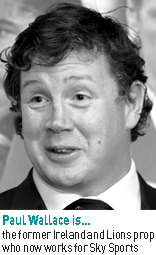
Paul O'Connell, Tom Court and Stephen Ferris celebrate victory over Australia during the RWC Pool C match
Ireland’s 15-6 win over Australia is their greatest World Cup result ever and arguably the finest hour of any of the nation’s sporting teams. It can be a marker for Ireland’s platinum generation to succeed the famous golden generation.
To judge whether it was their best performance ever I need to remove my green-shaded bifocals and use an ounce of objectivity. Ireland played very well but they were aided by a perfect storm of occurrences. 
Firstly, Australia’s best line breaker, Digby Ioane, their best poacher, David Pocock, and the glue that kept their front five together, Stephen Moore, were all ruled out injured. Ireland’s ability to start as underdogs despite having such a talented squad helped, too.
Finally, the weather turned sour and Australia just aren’t a wet-weather side. Ireland’s experience in managing a low-scoring affair in the rain showed as they out-thought the Aussies. Their ability to press until the opposition cracked was in contrast to the combustible Quade Cooper. It was a day for Heineken Cup-type rugby, not Super Rugby.
Ireland were defensively superb. For years the northern hemisphere has dutifully followed trends from the South, but Ireland are now pioneers of the gang or choke tackle. Instead of knocking the ball-carrier back and fighting on the deck for the turnover, Ireland look to tackle with two or three players surrounding the ball-carrier, keeping him upright so they can earn the turnover scrum.
This tactic worked extremely well throughout the game as Australia ran high into the tackle looking for the offload, just like Grand Slam-chasing England had in March, with the same result. No doubt sides will look to run with lower body positions so as to limit this ability.
Ireland’s scrum was also superb, but Australia are not an accurate barometer in this area! Ireland were also helped by two incorrect penalty calls by referee Bryce Lawrence and the Australian back row breaking up too early on occasions. One of these, late in the first half, was the turning point for me, when Jamie Heaslip kept the ball in and had a second drive to earn a penalty against effectively a five-man Wallaby scrum.
The other turning point was the penalty awarded to Ireland to go 12-6 ahead. Sekope Kepu should feel aggrieved as Mike Ross had nose-dived in the scrum and if the penalty had gone the other way it could have been an entirely different game.
The Irish attack was the weakest area and Ireland just aren’t creating space for the outside backs to utilise. If they can, this Ireland team can go from strength to strength. The confidence gained from beating a Tri-Nations side away from home is a big marker for Ireland, even if they weren’t playing in Australia and had what sounded like a home crowd roaring them on.
There is much talk of Ireland’s ‘Dad’s Army’ having their last bite at a World Cup but, from the starting team against Australia, Cian Healy, Stephen Ferris, Heaslip, Sean O’Brien, Johnny Sexton, Tommy Bowe, Rob Kearney and Keith Earls are all 27 or younger and a long way from the last-chance saloon.
This article appeared in the November 2011 issue of Rugby World Magazine.
Find a newsagent that sells Rugby World in the UK. Or you may prefer the digital edition on your MAC, PC, or iPad.
Would you like to sign up to Rugby World’s excellent weekly email newsletter? Click here.
For Back Issues Contact John Denton Services at 01733-385-170 visit




